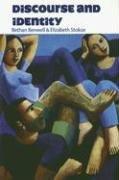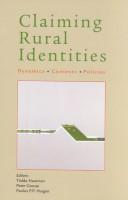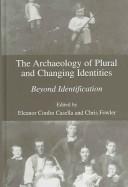| Listing 1 - 5 of 5 |
Sort by
|

ISBN: 9780748617500 9780748617494 9780748626533 0748617493 0748617507 9786610643196 1280643196 0748626530 9781280643194 6610643199 Year: 2006 Publisher: Edinburgh Edinburgh university press
Abstract | Keywords | Export | Availability | Bookmark
 Loading...
Loading...Choose an application
- Reference Manager
- EndNote
- RefWorks (Direct export to RefWorks)
'Identity' is a central organizing feature of our social world. Across the social sciences and humanities, it is increasingly treated as something that is actively and publicly accomplished in discourse. This book defines identity in its broadest sense, in terms of how people display who they are to each other. Each chapter examines a different discursive environment in which people do 'identity work': everyday conversation, institutional settings, narrative and stories, commodified contexts, spatial locations, and virtual environments. The authors describe and demonstrate a range of discourse and interaction analytic methods as they are put to use in the study of identity, including 'performative' analyses, conversation analysis, membership categorization analysis, critical discourse analysis, narrative analysis, positioning theory, discursive psychology and politeness theory. The book aims to give readers a clear sense of the coherence (or otherwise) of these different approaches, the practical steps taken in analysis, and their situation within broader critical debates. Through the use of detailed and original 'identity' case studies in a variety of spoken and written texts in order, the book offers a practical and accessible insight into what the discursive accomplishment of identity actually looks like, and how to go about analyzing it. Features: *Accessible introduction to the study of discourse and identity across a variety of contexts. *Interdisciplinary in scope, the book is relevant to a wide range of courses such as English language and linguistics, psychology, media, cultural studies, gender studies and sociology. *Each chapter includes a critical overview of work in the area, original case studies, practical instruction for analyses, points for further discussion and suggested reading.
Cultuur en maatschappij --- Culturele identiteit --- Pragmatiek ; taalwetenschap --- Sociolinguistiek --- Discourse analysis --- Identity (Psychology) --- #SBIB:309H511 --- #SBIB:309H518 --- Personal identity --- Personality --- Self --- Ego (Psychology) --- Individuality --- Discourse grammar --- Text grammar --- Semantics --- Semiotics --- Verbale communicatie: algemene pragmatiek, stilistiek en teksttheorie, discoursanalyse --- Verbale communicatie: sociologie, antropologie, sociolinguistiek --- Sociolinguistics --- Pragmatics --- Analyse du discours. --- Discourse analysis. --- Identiteit. --- Identity (Psychology). --- Identité (Psychologie). --- Analyse du discours --- Identité (psychologie) --- identité

ISBN: 9023235673 9789023235675 Year: 2000 Publisher: Assen Van Gorcum
Abstract | Keywords | Export | Availability | Bookmark
 Loading...
Loading...Choose an application
- Reference Manager
- EndNote
- RefWorks (Direct export to RefWorks)
Sociology, Rural. --- Rural development. --- Identity (Psychology) --- Sociologie rurale --- Développement rural --- Identité (Psychologie) --- Europe --- Rural conditions. --- Conditions rurales --- Rural development --- Sociology, Rural --- (1-22) platteland --- 338.26 plattelandsbeleid --- (4) Europa --- Rural sociology --- Sociology --- Community development, Rural --- Development, Rural --- Integrated rural development --- Regional development --- Rehabilitation, Rural --- Rural community development --- Rural economic development --- Agriculture and state --- Community development --- Economic development --- Regional planning --- Personal identity --- Personality --- Self --- Ego (Psychology) --- Individuality --- Citizen participation --- Social aspects --- Open ruimtefuncties --- Platteland --- Algemeen --- Algemeen. --- Développement rural --- Identité (Psychologie) --- Géographie rurale

ISBN: 1280233982 9786610233984 0306486954 0306486938 0306486946 9780306486937 9780306486944 9780306486951 Year: 2005 Publisher: Boston, MA Kluwer Academic/Plenum Publishers
Abstract | Keywords | Export | Availability | Bookmark
 Loading...
Loading...Choose an application
- Reference Manager
- EndNote
- RefWorks (Direct export to RefWorks)
"Questions of identity have plagued the field of archaeology since its earliest antiquarian origins. The ability to discover, recover, or uncover a past culture required the assumption of a direct relationship between its material remains and social identity. Artifacts and architectural features alike have been conceptualized as "signatures" or "representations" of specific cultures – from the "Beaker People" of the European Neolithic to the "Georgian" world view of eighteenth century Colonial America. Thus, archaeologists have employed an explicitly material focus in their examinations of identity. Yet, as people move through life they continually shift affiliation from one position to another, dependent on the wider contexts of their interactions. Different forms of material culture may be employed as affiliations shift, and the connotations of any given set of artifacts may change. In this volume the authors explore these overlapping spheres of social affiliation. Social actors belong to multiple identity groups at any moment in their life. It is possible to deploy one or many potential labels in describing the identities of such an actor. Two main axes exist upon which we can plot experiences of social belonging -- the synchronic and the diachronic. Identities can be understood as multiple during one moment (or the extended moment of brief interaction), over the span of a lifetime, or over a specific historical trajectory." - from the Introduction The international group of contributions each illuminate how the various identifiers of race, ethnicity, sexuality, age, class, gender, personhood, health, and/or religion are part of both material expressions of social affiliations, and transient experiences of identity. The Archaeology of Plural and Changing Identities: Beyond Identification will be of great interest to archaeologists, anthropologists, historians, curators and other social scientists interested in the mutability of identification through material remains.
Archaeology and history. --- Social archaeology. --- Identity (Psychology) --- Personal identity --- Personality --- Self --- Ego (Psychology) --- Individuality --- Archaeology --- Historical archaeology --- History and archaeology --- History --- Methodology --- Anthropology/archaeometry. --- Archeologie. --- Archéologie et histoire. --- Archéologie sociale. --- Identiteit. --- Identity (psychology). --- Identité (psychologie). --- Social science --- Social sciences, general. --- Sociale identiteit. --- Archaeology. --- Anthropology. --- Human beings --- Archeology --- Anthropology --- Auxiliary sciences of history --- Antiquities --- Primitive societies --- Social sciences

ISBN: 2253150053 9782253150053 Year: 2008 Volume: 15005 Publisher: Paris Grasset & Fasquelle
Abstract | Keywords | Export | Availability | Bookmark
 Loading...
Loading...Choose an application
- Reference Manager
- EndNote
- RefWorks (Direct export to RefWorks)
"Depuis que j'ai quitté le Liban pour m'installer en France, que de fois m'a-t-on demandé, avec les meilleures intentions du monde, si je me sentais "plutôt français" ou "plutôt libanais". Je réponds invariablement : "L'un et l'autre !" Non par quelque souci d'équilibre ou d'équité, mais parce qu'en répondant différemment, je mentirais. Ce qui fait que je suis moi-même et pas un autre, c'est que je suis ainsi à la lisière de deux pays, de deux ou trois langues, de plusieurs traditions culturelles. C'est cela mon identité... " Partant d'une question anodine qu'on lui a souvent posée, Amin Maalouf s'interroge sur la notion d'identité, sur les passions qu'elle suscite, sur ses dérives meurtrières. Pourquoi est-il si difficile d'assumer en toute liberté ses diverses appartenances ? Pourquoi faut-il, en cette fin de siècle, que l'affirmation de soi s'accompagne si souvent de la négation d'autrui ? Nos sociétés seront-elles indéfiniment soumises aux tensions, aux déchaînements de violence, pour la seule raison que les êtres qui s'y côtoient n'ont pas tous la même religion, la même couleur de peau, la même culture d'origine ? Y aurait-il une loi de la nature ou une loi de l'Histoire qui condamne les hommes à s'entre-tuer au nom de leur identité ? C'est parce qu'il refuse cette fatalité que l'auteur a choisi d'écrire les Identités meurtrières, un livre de sagesse et de lucidité, d'inquiétude mais aussi d'espoir.
804.0 --- 840 --- 840 Franse literatuur --- Franse literatuur --- 804.0 Frans. Franse taalkunde --- Frans. Franse taalkunde --- Group identity --- Identity (Philosophical concept). --- Minorities. --- Ethnicity. --- Ethnic relations. --- Group identity. --- Identity (Philosophical concept) --- Minorities --- Ethnicity --- Ethnic relations --- Identité culturelle --- Identité ethnique --- Identity (Psychology) --- Identité (Psychologie) --- Identité collective --- 840 French literature. Literature in French --- French literature. Literature in French --- Geweld --- Identiteit --- Persoonlijkheid --- Ethnicité --- Relations interethniques --- Identité collective --- Altérité (philosophie) --- 1970-2000 --- Liban
Book
ISBN: 9781441979889 9781441979872 128011682X 9786613521118 1441979883 Year: 2011 Publisher: New York Springer
Abstract | Keywords | Export | Availability | Bookmark
 Loading...
Loading...Choose an application
- Reference Manager
- EndNote
- RefWorks (Direct export to RefWorks)
Identity is one of the most extensively studied constructs in the social sciences. Yet, despite the wealth of findings across many disciplines, identity researchers remain divided over such enduring fundamental questions as: What exactly is identity, and how do identity processes function? Do people have a single identity or multiple identities? Is identity individually or collectively oriented? Personally or socially constructed? Stable or constantly in flux? The Handbook of Identity Theory and Research offers the rare opportunity to address the questions and reconcile these seeming contradictions, bringing unity and clarity to a diverse and fragmented literature. This exhaustive reference work emphasizes the depth and complexity of identity processes and domains and presents perspectives from many different theoretical schools and empirical approaches. Contributing authors provide perspectives from psychology (e.g., narrative, social identity theory, neo-Eriksonian) and from other disciplines (e.g., sociology, political science, ethnic studies); and the editors highlight the links between chapters that provide complementary insights on related subjects. In addition to covering identity processes and categories that are well-known to the field, the Handbook tackles many emerging issues, including: Identity development among adopted persons. Identity processes in interpersonal relationships. Effects of globalization on cultural identity. Transgender experience and identity. Consumer identity and shopping behavior. Social identity processes in xenophobia and genocide. The Handbook of Identity Theory and Research lends itself to a wealth of uses by scholars, clinicians, and graduate students across many disciplines, including social, developmental, and child/school psychology; human development and family studies; sociology; cultural anthropology; gender, ethnic, and communication studies; education; and counseling.
Developmental psychology --- Social psychology --- Sociology --- Educational psychology --- Personality development --- Teaching --- Ethnology. Cultural anthropology --- Psychiatry --- schoolpsychologie --- sociale psychologie --- sociologie --- onderwijs --- psychotherapie --- kinderpsychologie --- ontwikkelingspsychologie --- counseling --- persoonlijkheidsontwikkeling --- Consciousness. --- Developmental psychology. --- Anthropology. --- Applied psychology. --- Applied psychology --- Psychagogy --- Psychology, Practical --- Social psychotechnics --- Psychology --- Human beings --- Development (Psychology) --- Developmental psychobiology --- Life cycle, Human --- Apperception --- Mind and body --- Perception --- Philosophy --- Spirit --- Self --- Identity (Philosophical concept) --- Identity (Psychology) --- Consciousness --- Identité --- Identité (Psychologie) --- Psychologie du développement --- Conscience --- EPUB-LIV-FT LIVPSYCH SPRINGER-B --- Behavioral sciences --- Mental philosophy --- Mind --- Science, Mental --- Human biology --- Soul --- Mental health --- Personal identity --- Personality --- Ego (Psychology) --- Individuality --- Identity --- Comparison (Philosophy) --- Resemblance (Philosophy) --- Personality. --- Social psychology. --- Child psychology. --- School psychology. --- Sociology. --- Education. --- Psychotherapy. --- Counseling. --- Personality and Social Psychology. --- Child and School Psychology. --- Sociology, general. --- Education, general. --- Psychotherapy and Counseling. --- Counselling --- Helping behavior --- Psychology, Applied --- Clinical sociology --- Interviewing --- Personal coaching --- Social case work --- Therapy (Psychotherapy) --- Mental illness --- Mental health counseling --- Children --- Education, Primitive --- Education of children --- Human resource development --- Instruction --- Pedagogy --- Schooling --- Students --- Youth --- Civilization --- Learning and scholarship --- Mental discipline --- Schools --- Training --- Social theory --- Social sciences --- Psychology, School --- Behavior, Child --- Child behavior --- Child study --- Pediatric psychology --- Child development --- Mass psychology --- Psychology, Social --- Human ecology --- Social groups --- Personality psychology --- Personality theory --- Personality traits --- Personology --- Traits, Personality --- Persons --- Temperament --- Treatment --- Education --- Primitive societies
| Listing 1 - 5 of 5 |
Sort by
|

 Search
Search Feedback
Feedback About UniCat
About UniCat  Help
Help News
News